6. DENSO Spirit Collaboration Exemplified
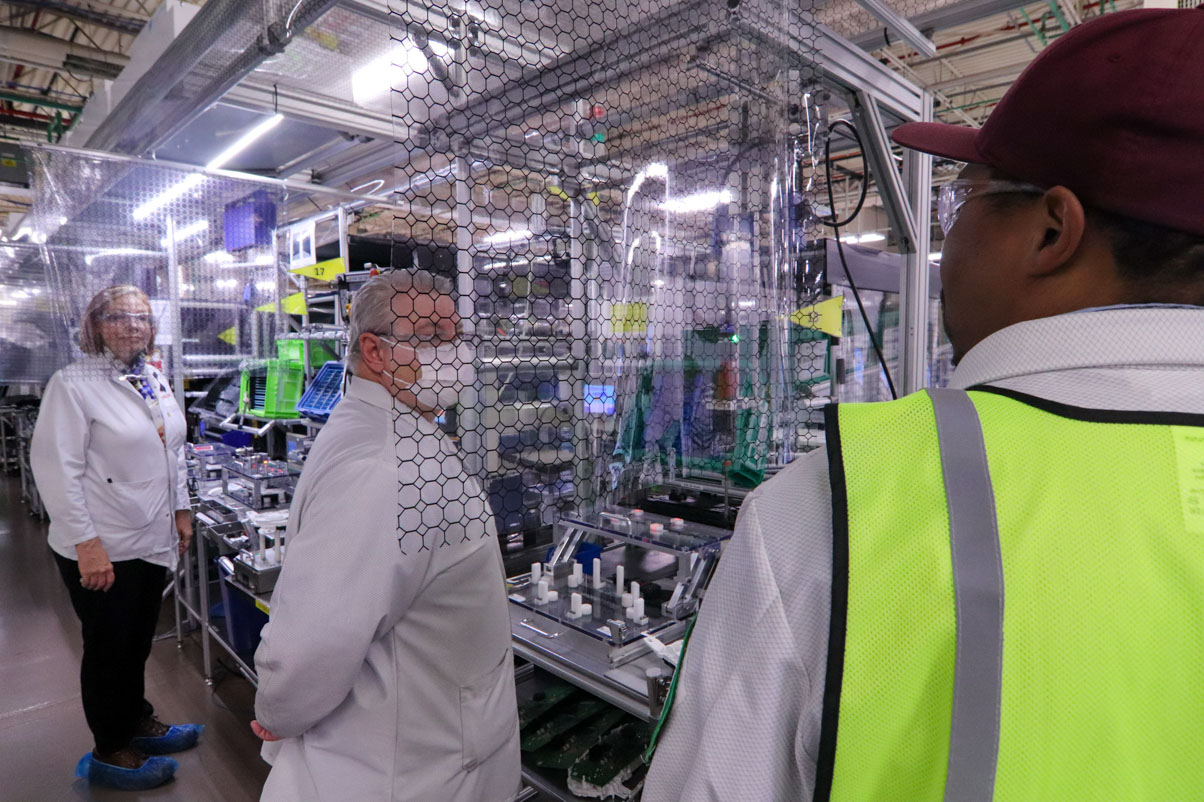
Battle Creek, Michigan, is home to DENSO Manufacturing Michigan, Inc. (DMMI), DENSO’s first plant in the United States, and its lead production center for North American thermal operations. Natalie Scott is Communications Manager at DMMI and responsible for all internal messaging. As part of a rapid-response group, she was tracking overseas and state-side developments in January 2020, as COVID-19 began snaking across the globe.
At DENSO North American headquarters in Southfield, Michigan, Bob Townsend, vice president, Corporate Services, watched as media outlets began reporting with greater frequency on the virus spreading beyond Wuhan, China, to other parts of the world. It was early January, and he knew it was time to start talking about forming a crisis team.
On January 21, the U.S. confirmed its first case of COVID-19. Jon Canty, DENSO’s General Counsel in North America, began assessing how his team would manage numerous state requirements and federal mandates that might soon be coming into play.
A Global Emergency
With cases confirmed in the U.S., Germany, Japan, Vietnam and Taiwan, the World Health Organization issued a world health emergency on January 31. Air travel was being restricted.
In February, after the Trump Administration declared a health emergency, Julie Kerr, senior manager, Corporate Communications, began “rattling the cages” as the virus threatened DENSO operations in North America, Europe and Asia.
By then, Steve Milam, senior vice president, Corporate Planning, Finance, IT and Audit, who would lead the North American COVID taskforce, had gathered DIAM’s Human Resources team to begin developing preliminary plans for potential associate issues related to what was now a looming health crisis.
Denise Carlson, who had been recently appointed as North America Vice President for Safety, Health and Environment, recalled that mid-March 2020 was when infections exploded and effects to North American operations were starting to be felt.
A Strategy of Preparedness
“We had been through H1N1 and the ’bird flu’ and had a sense of the scenario,” Julie shared. “We had processes established, knew who needed to be on the response team, had crisis communication plans and a safety manual. We were prepared for the worst and hoping for the best.”
North America held its breath as the virus advanced. During those weeks, DENSO followed the lead of its customers in the U.S. If they were in production, DENSO would be committed to doing the same.
“I didn’t expect COVID to materialize,” Bob admitted. “But when it did, it was like the Titanic hitting the iceberg, and within a week everyone had to be off the ship. We worked around the clock to make that happen.”
When Michigan’s governor ordered the mandatory shut-down on March 23, DMMI had already established a regular cadence of meetings and a cross-functional task force.
"DENSO is a supplier to most major automakers, so we were in constant communication with the DIAM team about what our customers were deciding to do," Natalie said. "Once the order came to close, the question wasn't 'if' we would take care of our associates, but 'how.'"
Later, DMMI would coordinate with Battle Creek’s public health department, its police force and community leadership on COVID response best practices.
Initial Confusion and Concern
Despite months of tracking the virus, and preparations in place from previous epidemics, orders to shut down in states across the country and in Canada caused initial confusion.
“We had discussed government intervention, but we didn’t predict the governor closing down the state,” Steve recalls. “When she did, we knew that virtually every aspect of our business was evolving and that the potential impact was as big as we suspected.”
With DENSO production down in the U.S., face masks quickly became a lifeline to companies needing to remain in operation. In response, DENSO Japan (DNJP) began manufacturing masks and shipping them to DENSO plants around the world.
“DENSO locations are primarily autonomous and act at the local level, which has served us well,” said Denise, who was a member of the COVID taskforce. “But for this pandemic we had to coordinate from a North American perspective. I’m proud to say that we succeeded because we all believed we were in this together.”
Jon recalls partnering with DENSO’s public affairs team to monitor requirements across six states and several counties to determine how best to comply with an array of rules.
“We were constantly reading and reviewing state-issued orders and county updates,” Canty said. “We had to understand the rules, how to apply them and remember that there were federal and CDC regulations, too. Everything was urgent, and evolving and intense.”
A feeling DENSO has felt in the past and prepared for. That’s because in its 75 years of operations, the company has weathered challenges of literal magnitude. And now, as it focused on what needed to be done, it coolly mustered its teams, and they all got to work.
Their priorities were clear: ensure the well-being of DENSO associates; start plans to reopen and meet customer needs and contribute to the global effort to mitigate COVID’s impact.
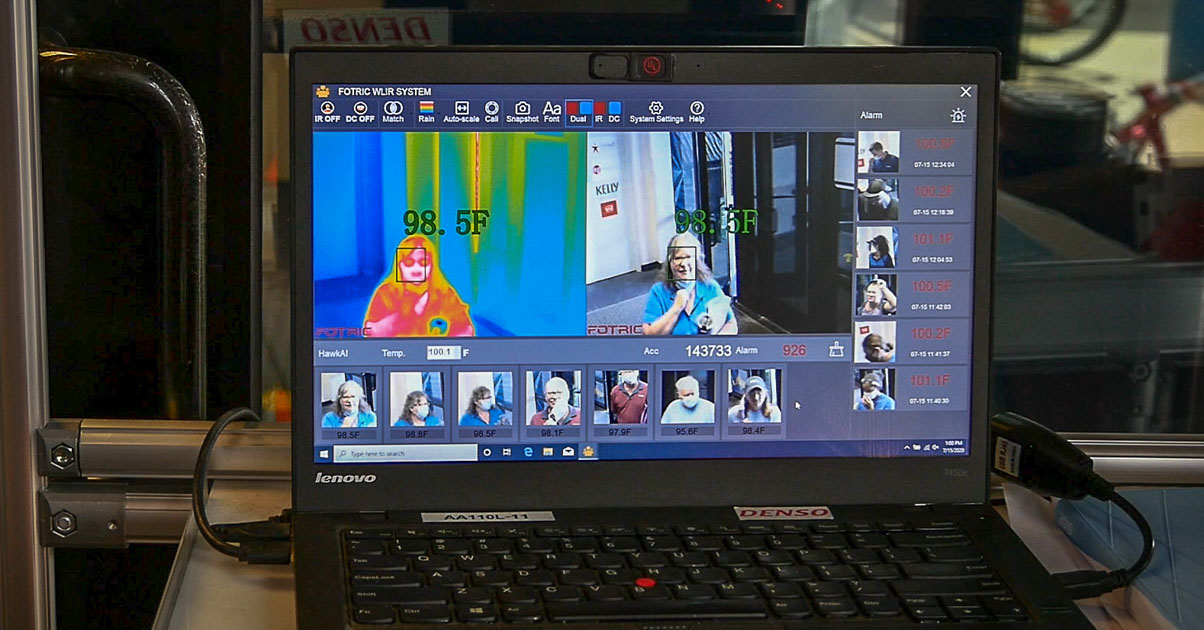
The Top Priority
“The most important thing was making sure associates knew we cared about them more than the physical and financial aspects of the business. But we also needed to ensure our associates were ready for production again, so we did everything needed to keep our teams intact,” Julie said.
“We tackled how, if the plants weren’t running, we paid associates and treated customer orders,” Steve added. “If an associate got sick, we determined they stayed home and got paid. Our message was consistently to not worry. We were focused on safety first.”
“There was confusion and uncertainty about COVID among our associates,” Natalie shared. “They relied on us to connect them to official and true sources of information from the public health department and the U.S. Centers for Disease Control and Prevention. We provided DMMI associates with a daily COVID update.”
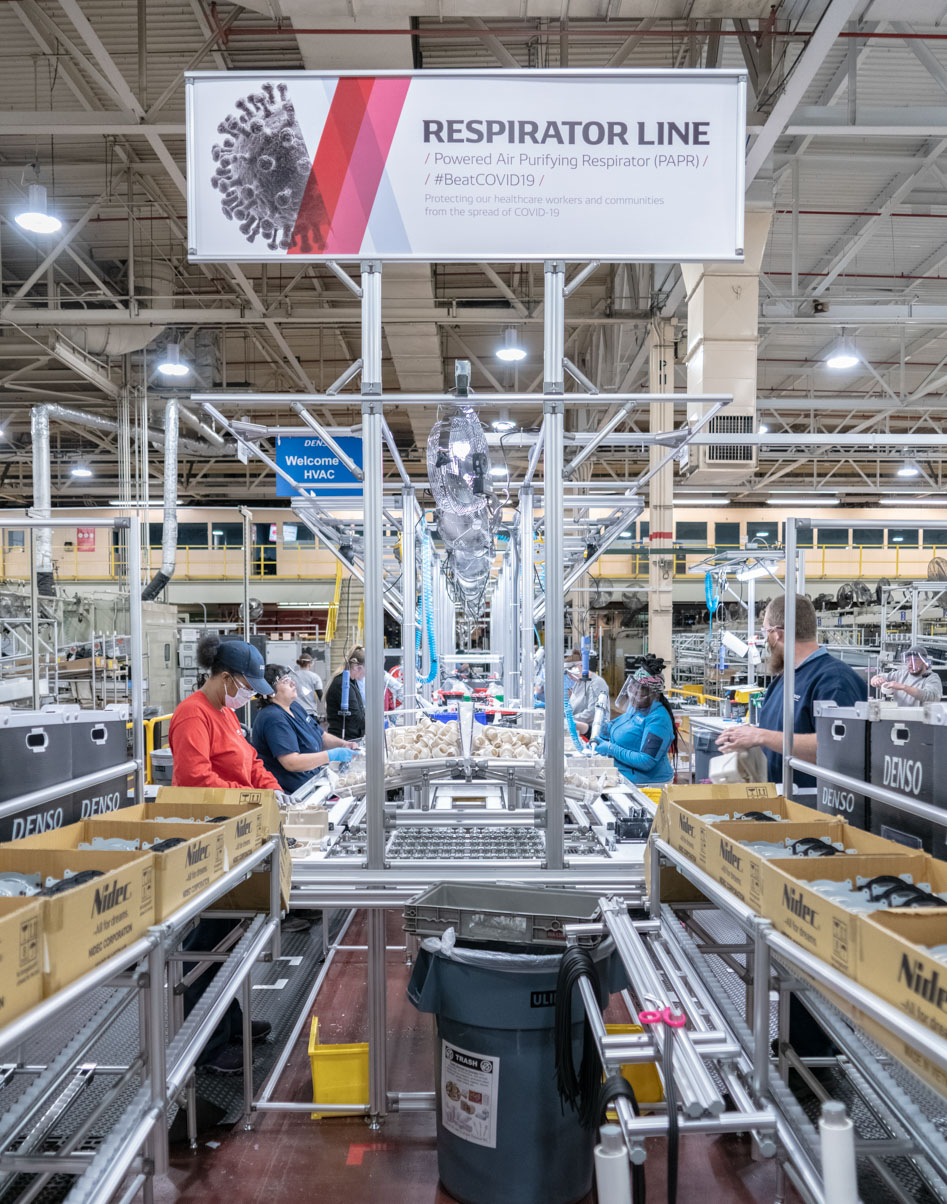
Restarting Production
“By April 2020, we had developed a COVID toolkit for going back to work. We educated associates about social distancing guidelines, had secured hundreds of thousands of facemasks, erected physical barriers, and shared the facts about COVID. Only after everything was rolled out did we begin to restart production,” Denise recalled.
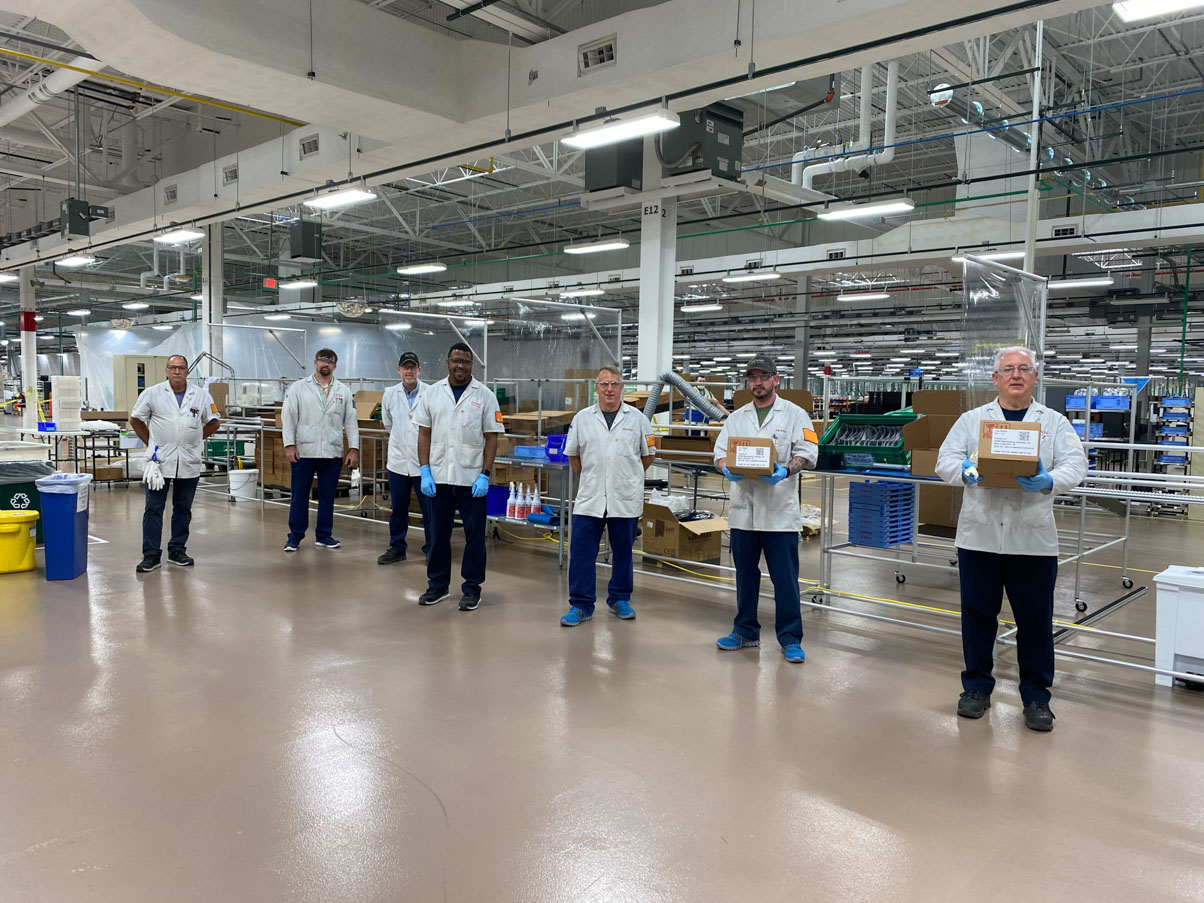
“We were tracking state and federal rules about essential manufacturing, determining how best to apply those rules, and discussing how we could get back to manufacturing,” Jon said.
“DENSO had shut down for five weeks in North America. We ramped up piece by piece, and it took a few months to fully reopen and for all the customers to be back in full production. Our considered and thorough approach gained the attention of Michigan’s governor, who requested information about our back-to-work model, and customers who commented on our seamless start-up and ability to coalesce,” Steve remarked.
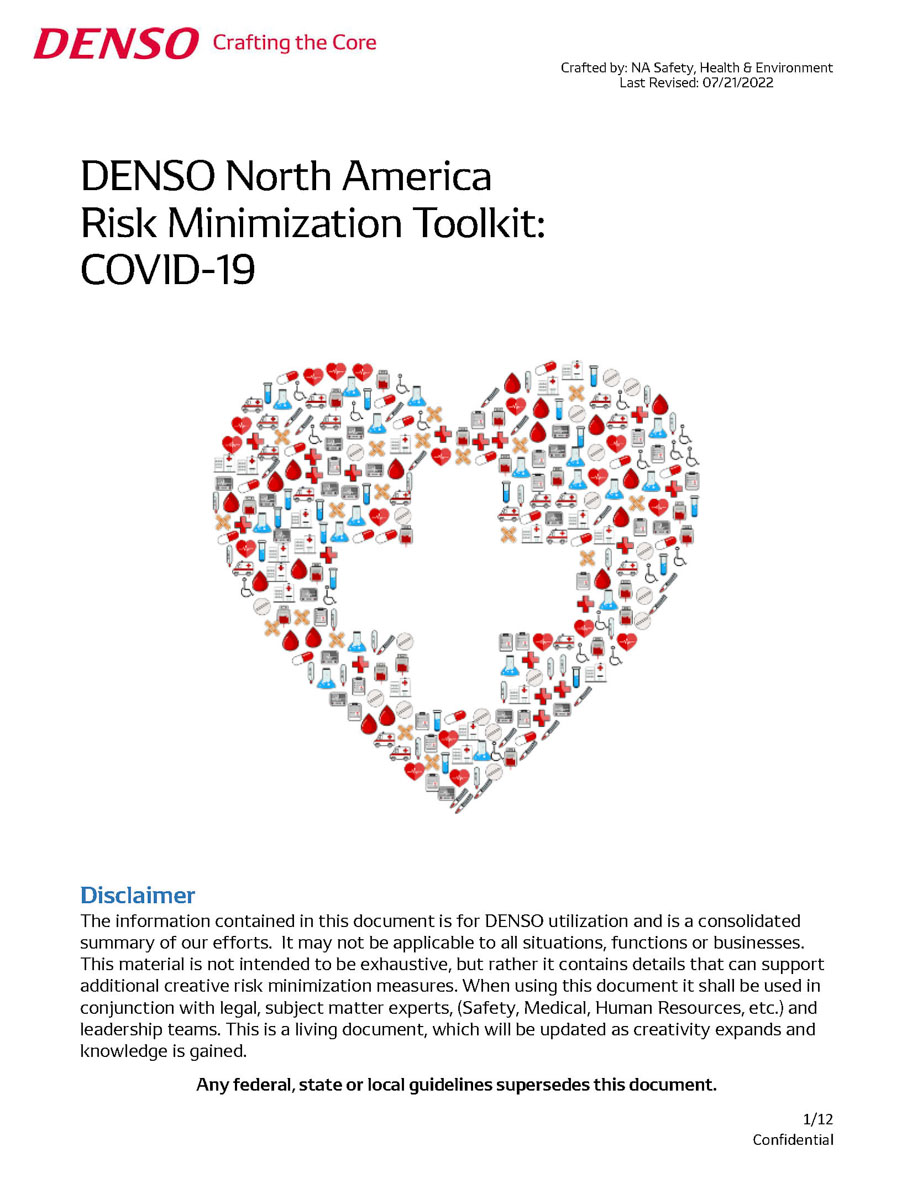
“Our customers wanted our plants to run so we wanted them to run, too,” Denise shared. “But there was a lot of discussion with them to ensure associate safety, which was always our first priority. Our agreed upon North America approach was for sales to leverage our strong customer relationships and then balance the needs of all the stakeholders. We all understood that we were in this together.”
The Pandemic’s Toll
“I feared for my family loved ones and our associates,” Julie said. “I wondered if we were going to survive. If we were OK … as people, as a company. The constant uncertainty was the worst. Would there be an end, when and what would we lose? I’m so proud of our work but it was the most exhausting thing I’ve ever done.”
“This was a true balancing act. I was taking meetings and leading activities in hospital rooms as my daughter battled COVID. I managed to keep my personal and professional lives separate and made the best decisions for DENSO after weighing the options from all sides. But sometimes I didn’t know what day it was.” Denise admitted.
“Associates got sick and didn’t make it. We honored them with a letter from our North American CEO and President Ken Ito, and sent along other messages, flowers and support through their family’s transition. We kept it simple and kind and respectful,” Steve said.
“People we cared about were suffering, they were hospitalized, and some died,” Natalie recalled. “When we lost people, when there were sad stories, I went outside and cried and then came back and got to work.”
What We Remember
“When you go through a crisis together you form unbreakable bonds with your teammates. We leaned on each other, and I have immeasurable respect for each of them. Everyone at DENSO had a role in getting us all through this global pandemic,” said Julie.
“Since COVID, our team has collaborated more regularly,” Jon said. “That first year, I had regular check-ins that were more about well-being and family and adjusting to a new work environment and less about business. That has evolved into a weekly check-in today. There is greater communication now within our team and with our business partners, which has been very positive.”
“It took us two days to cycle through every North American team for our regular updates, which means that for one year our task force and supporting associates had incredibly long work hours. This crisis required commonality among several nearly autonomous DENSO businesses. But as long as we stuck with core DENSO principals as our guide, we came together. To this day, I still don’t know how to adequately, and in a worthy way, recognize the amount of effort for going above and beyond, willingly, daily and tirelessly,” Steve shared.
“COVID was huge, and global, and as we look at the end of it like the climax in a big story,” Bob said. “At the very start of it, DENSO had to find itself and reposition to survive. And do so nearly overnight. But that’s how we started 75 years ago. DENSO was always going to evolve – COVID expedited this , and in doing so, we have redefined, repositioned, learned, and now we’re truly ready for the next phase.”